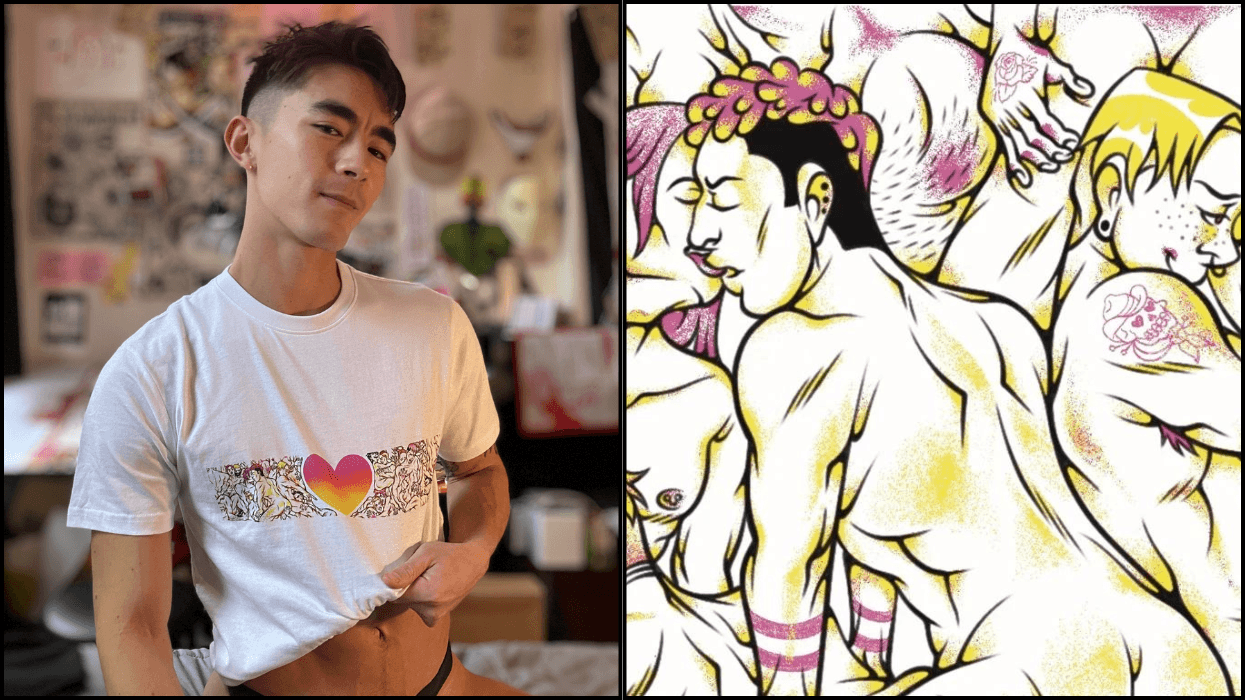
Was Jack really gay-bashed? Will Ennis love again? What was Heath Ledger's inspired addition to the script? Screenwriters Larry McMurtry and Diana Ossana take us inside their runaway hit
February 13 2006 12:00 AM EST
November 15 2015 6:16 AM EST
By continuing to use our site, you agree to our Private Policy and Terms of Use.

Was Jack really gay-bashed? Will Ennis love again? What was Heath Ledger's inspired addition to the script? Screenwriters Larry McMurtry and Diana Ossana take us inside their runaway hit
If not for Diana Ossana, it's highly doubtful we'd be cheering Brokeback Mountain on the screen. Deeply moved by Annie Proulx's 1997 story, Ossana shared it with her celebrated writing partner Larry McMurtry (Lonesome Dove, The Last Picture Show, Terms of Endearment, and so on). The two optioned Proulx's work and, within weeks, finished a screenplay. Then they embarked on years of meetings with Hollywood types who said the movie would never be made. As everyone knows, Ossana and McMurtry won that battle. As awards season heads into the home stretch, they're still winning. Speaking with The Advocate in Los Angeles--the acerbic McMurtry punctuating throughout--Ossana insists, "Larry and I never lost faith in our screenplay. I would get frustrated at times when people would tell us, 'It's the best script I've ever read.' If that's true, I'd think, then commit. Come on! Let's do this thing."
Are you surprised by audiences' reactions to this film? Ossana: It just makes me really happy that so many people are going to see the film and that so many are moved by it. The farther the film seems to go on the northern plains, into Sioux Falls, S.D., and Fargo, N.D., the quieter the audiences become. That's some of the most conservative parts of the country. And those folks are going in just wanting to see a good story, and they're just riveted to the screen. I mean, that was the point when I first read that story in 1997. I wanted to get it out in the world in some major way, and have people feel the things I felt when I read that story.
In the new annotated edition, Annie Proulx describes the man who inspired Ennis--an aging ranch hand she saw one night alone in a bar watching the young cowboys play pool. She writes, "Something in his expression, a kind of bitter longing...made me wonder if he was country gay." In your growing up, were there people who were country gay? McMurtry: When I was a little boy I had a cousin who was gay who was a rodeoer. I didn't see all that much of Cousin X--
Cousin X? [Anne laughs] McMurtry: Yes. He lived with a schoolteacher in one of the towns in Texas, near where we set Jack's life in the film. And the first vibe I ever got, I suppose, having to do with homosexuality was when we'd go up to family reunions, my father and mother would say, "Now, please be very polite to Cousin X's gentleman friend." We had no reason not to be. The gentleman friend was perfectly nice. And yet there was some anxiety in my parents that somehow there would be an awkwardness or something like that. There never was. I don't even know what happened to Cousin X and his gentleman friend. They're old enough to have died by now.
No sense of "Be careful, Cousin X's gentleman friend is liable to get you in a corner "? McMurtry: [A near-smile] The reunions were held outdoors on the great plains. There were no corners where anybody could have got us. Ossana: I grew up in St Louis, and there were gay people in my high school. There's an incident I remember very well. It really affected me. There were these two girls in my class. They were both very athletic, very nice girls, and they were together all the time. We just assumed they were best friends. But they did get made fun of for being queer. That's the word everybody used back then. One girl it didn't bother so much. The other girl, in my senior year she committed suicide.
Proulx writes that she still gets letters from people who personally relate to the characters in her story. McMurtry: We just got a letter, very sad, from an Arizona cowboy. Ossana: He wanted to thank us and Heath and Jake for making this film. He said he felt like he was watching his story up on the screen. He said, "You know, I'm gonna be 70, and I feel full of regret. There were a couple of men that I loved, one of whom was married and had three children. We never followed through on any of it. We just didn't feel free to do it."
According to Proulx, Wyoming has the highest suicide rate in the country--and most of those suicides are elderly single men. Did you two imagine Ennis's future at all? Ossana: I think Annie has a story somewhere about Ennis as an older man, and he winds up moving in with Alma Jr. McMurtry: I don't think Ennis would kill himself. Ossana: He's too tough. That would be a sign of weakness, and it would leave a memory of him as being weak, and I don't think he would want that. But I do think that Ennis knows that people probably know that he's homosexual, and emotionally [at the end of the film] I think he makes a tiny bit of progress, because he agrees to attend Alma Jr.'s wedding. Finally he compromises-- McMurtry: And doesn't disappoint a woman. Ossana: It's the first time in the film that he doesn't disappoint someone, male or female. It's a tiny baby step, but he does it. I just don't know how much [more] he's capable of changing. I think if anything, he might become even more homophobic and bitter because of what he did, what he gave up, what he lost, what he'll never have.
Ennis is convinced that Jack was murdered with a tire iron. I don't necessarily believe it. McMurtry: It's what Ennis is feeling at the moment. But Lureen's explanation is just as good. A lot of tires blow up and kill people.
Do people hope Jack wasn't murdered? What do they believe? Ossana: We've been asked that [in every interview]. You can't believe the things we've heard--for example, did Lureen's father have him killed? A reporter walked up to me and said, "What really happened? I need to know." I said, "What do you think?" He told me, and I said, "Well, if that works for you, then good."
Oh, that's the most hateful writer answer. Ossana: But even Annie will tell you it's ambiguous to her. When you see that [flash] on the screen, we tell people that [we don't know] what actually happened to Jack. But it's what Ennis thinks, and he's been set up to think that by his entire past. This was his biggest fear, that something would happen. And the tragedy is multilayered. If Jack was killed that way, the guilt that Ennis must feel--maybe if he'd taken him up on it, this wouldn't have happened. But also the fact that he's not sure. What is more tragic than not knowing how your loved one has died?
There's "don't ask, don't tell" for you. Ossana: So when he goes to Jack's parents'-- McMurtry: It's when Ennis goes there that it becomes a great movie, that it becomes a tragedy. Ossana: The father's talking about Jack--"Ennis Del Mar, he used to say." The camera turns to Ennis and you see this little faint smile on his face, 'cause Jack was talking about him. Then the father says, "And then Jack was gonna bring another fellow up here." And you go back to Ennis and his smile is gone. That's when he realizes there was somebody else. That hurts too. But he knows in his innards that it's his own fault. He can't blame Jack for that anymore. And then he goes up to Jack's room and he finds his old shirt hanging tucked inside Jack's, and he realizes how much that man loved him--how deeply he loved him from the get-go. I had to see the movie twice before I realized that later on, when Ennis had those shirts hanging in his trailer, he'd tucked Jack's inside his. Did you two come up with that? Ossana: No. That was Heath.
What's the stupidest question you've been asked so far? McMurtry: Somebody asked us if we could see ourselves writing a sequel about Ennis which has a happy ending. Ossana: We've been asked so many questions, some of which have raised the hair on the back of my neck. The first time we were asked if we felt brave for doing this, I was startled. The only time I felt any fear was when my daughter was in Laramie, Wyo., when they found Matthew Shepard. This was a year after we wrote the script, and it just hit home again, how from 1963 to the late '90s it was the same. It wasn't any different.
Some conservative pundits are saying your film attacks the myth of the cowboy. Larry, you ought to know: Does the myth of the cowboy need preserving? McMurtry: I've discovered that it's very hard to demythicize the cowboy. It's the most iconic American figure of all. Ossana: To say that we've attacked this masculine icon just seems silly. John Wayne and his movies will always be there. You both live in red states. When you were working on this film, did you ever think about political aftermath? McMurtry: Never. Ossana: People are people. We all feel emotion. Every single person on this planet, and they'd be lying if they denied it, has felt loneliness in their lives. McMurtry: The gratifying thing is that this movie has played well in all color states, red and blue. It draws them in because millions and millions of families have some gay member, involvement, problem, something. And I think people are seeking understanding in coming to this film. We've tapped into the zeitgeist somehow or other. It's something you can't really plan--it either happens or it doesn't happen. The zeitgeist was waiting there out of sight and we didn't know. Who was the Texas-hairdo consultant? Ossana: Ang Lee and the production designer came to Texas. We took them to Wichita Falls. And Ang saw people that still looked like that, so that stayed in his and Judy Becker's minds, I'm sure. Let me ask you about attending the Golden Globes. Larry, I know this is not your first time at that rodeo-- McMurtry: Yes, it was my first time. I've never been to an awards show of any kind until then. I've been nominated for Oscars and stuff; I just didn't go. I never wanted to go. Still don't, actually. [All laugh] But this movie is special. It's up there with Terms of Endearment--at least as good, maybe better. When you and Diana won for Best Screenplay, you thanked your typewriter for keeping you out of the "dry embrace of the computer." It was the most original acceptance speech I've heard in a long time. McMurtry: Thank you. I've got a better one if we win the Oscar.
Want more breaking equality news & trending entertainment stories?
Check out our NEW 24/7 streaming service: the Advocate Channel!
Download the Advocate Channel App for your mobile phone and your favorite streaming device!

